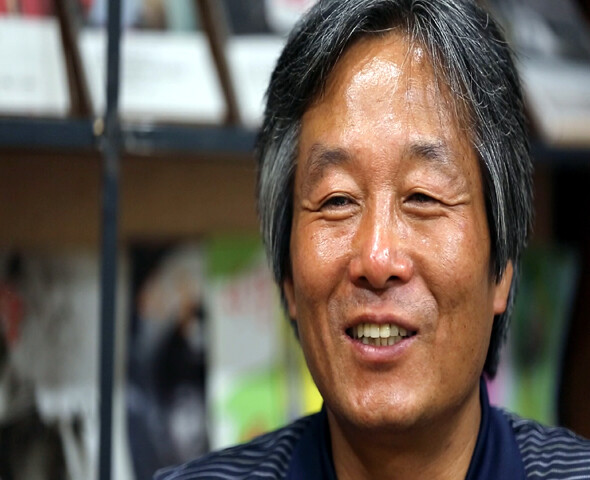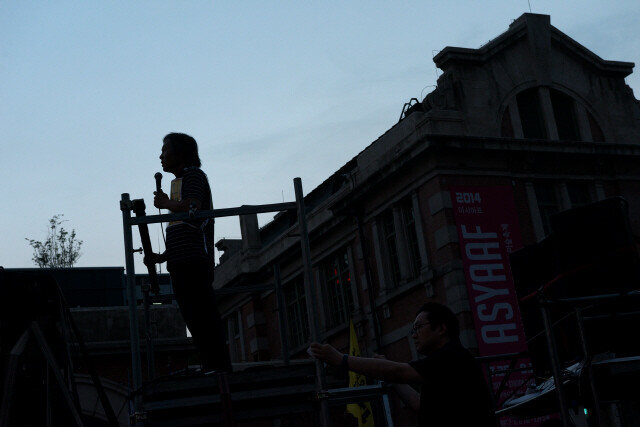hankyoreh
Links to other country sites 다른 나라 사이트 링크
Human rights activist arrested in apparent political ploy

At around midnight on July 16, messages began going up on Facebook about the issuance of a preliminary arrest warrant for Park Rae-gun, the 54-year-old director of the Center of Human Rights. A member of the standing committee for the group April 16 Alliance, which has been calling for an investigation into the 2014 Sewol ferry sinking, Park had been under investigation for three months on charges of Assembly and Demonstration Act violation and obstruction of special official duties for his role in organizing four memorial rallies around
Jongno Police Station in Seoul, which had previously requested the preliminary arrest warrant application from prosecutors after completing a search and seizure and calling Park in for questioning.
“While our search and seizure did not turn up much relevant evidence, it appears that evidence was destroyed,” the police said, adding that it had “concerns about additional evidence destruction and a possible flight risk.”
Lee Seung-gyu, a warrant judge at Seoul Central District Court, agreed to the request, noting the flight risk and the “substantiation of some charges.”
Park’s arrest is his fourth since joining the campaign for human rights two decades ago. Three of his arrests came while opposing the US military base at Daechu Village in Pyeongtaek, Gyeonggi Province and working with a pan-national countermeasures committee in the wake of the 2009 Yongsan tragedy, in which five demolition protesters and one police officer lost their lives.
Poet Song Gyeong-dong decried the arrest in a Facebook message.
“A country that arrests human rights activists . . . first Daechu Village, Yongsan, and the Hope Buses, and now Sewol protestors are being hauled in and standing side by side in the defendants’ box,” he wrote.
Park entered the Yonsei University department of Korean literature in 1981 with dreams of becoming a novelist. He took part in the student and labor movements while in school, but his decision to become a human rights activist in earnest came after his younger brother Rae-jeon, then president of the Soongsil University College of Liberal Arts student council, committed suicide by self-immolation in 1988 to protest the Roh Tae-woo administration. He has been one of the country’s leading campaigners, working in an ever-broader range of human rights areas for the release of conscientious objectors, the eradication of torture, the investigation of suspicious politically related deaths, residents’ rights, the minimum wage, and irregular workers.
Park’s attorneys claim that he only organized the rallies and did not plan or direct any illegal actions. They also argue that the police themselves provoked clashes by spraying protesters with from water mixed with pava (an incapacitant spray) from water cannons after they were already agitated over the erection of vehicle barricades.
The decision to arrest a rally organizer three months after the fact - without any attempts to flee - is seen as unusual. Another arrest warrant request for Kim Hye-jin, a member of the April 16 Alliance organizing committee, was rejected by the court.
“The fact that they issued a warrant even though [Park] had participated willingly in the questioning and there was no real flight risk shows that they were thinking more about the political and social situation rather than considering the legal aspect,” said Kim Deok-jin, secretary-general of the Catholic Human Rights Committee.
Yeom Hyeong-guk, one of the attorneys representing Park, noted the judge had given explicit orders not to “interpret the findings in political terms” when the warrant review was started on July 16.
But according to Myeong Sook of the human rights group Sarangbang, the decision “turned out to be political in the end.”
Kim Nam-ju, an attorney who met with Park at the Jongno Police Station detention center on July 17, quoted him as saying he had “seen this kind of suppression coming once [former Minister of Justice] Hwang Kyo-ahn became Prime Minister.”
The April 16 Alliance said it plans to carry out a signature campaign to call for Park’s release and “alert the country and international community to the illegitimacy of the arrest.”

By Oh Seung-hoon, Kim Kyu-nam and Kim Mi-hyang, staff reporters
Please direct questions or comments to [english@hani.co.kr]

Editorial・opinion
![[Column] Season 2 of special prosecutor probe may be coming to Korea soon [Column] Season 2 of special prosecutor probe may be coming to Korea soon](https://flexible.img.hani.co.kr/flexible/normal/500/300/imgdb/original/2024/0426/3317141030699447.jpg) [Column] Season 2 of special prosecutor probe may be coming to Korea soon
[Column] Season 2 of special prosecutor probe may be coming to Korea soon![[Column] Park Geun-hye déjà vu in Yoon Suk-yeol [Column] Park Geun-hye déjà vu in Yoon Suk-yeol](https://flexible.img.hani.co.kr/flexible/normal/500/300/imgdb/original/2024/0424/651713945113788.jpg) [Column] Park Geun-hye déjà vu in Yoon Suk-yeol
[Column] Park Geun-hye déjà vu in Yoon Suk-yeol- [Editorial] New weight of N. Korea’s nuclear threats makes dialogue all the more urgent
- [Guest essay] The real reason Korea’s new right wants to dub Rhee a founding father
- [Column] ‘Choson’: Is it time we start referring to N. Korea in its own terms?
- [Editorial] Japan’s rewriting of history with Korea has gone too far
- [Column] The president’s questionable capacity for dialogue
- [Column] Are chaebol firms just pizza pies for families to divvy up as they please?
- [Column] Has Korea, too, crossed the Rubicon on China?
- [Correspondent’s column] In Japan’s alliance with US, echoes of its past alliances with UK
Most viewed articles
- 1[Column] Season 2 of special prosecutor probe may be coming to Korea soon
- 2‘We must say no’: Seoul defense chief on Korean, USFK involvement in hypothetical Taiwan crisis
- 3Division commander ordered troops to enter raging flood waters before Marine died, survivor says
- 4Is N. Korea threatening to test nukes in response to possible new US-led sanctions body?
- 5Is Japan about to snatch control of Line messenger from Korea’s Naver?
- 6No good, very bad game for Korea puts it out of Olympics for first time since 1988
- 7[Editorial] Korea’s surprise Q1 growth requires objective assessment, not blind fanfare
- 8Korea’s 1.3% growth in Q1 signals ‘textbook’ return to growth, says government
- 9N. Korean delegation’s trip to Iran shows how Pyongyang is leveraging ties with Moscow
- 10Amnesty notes ‘erosion’ of freedom of expression in Korea in annual human rights report